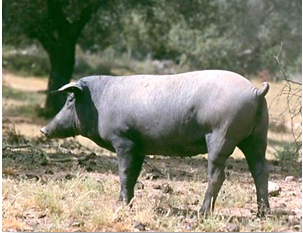Description: The Carne de Porco Alentejano PDO is obtained from carcasses weighting between 50 and 100 kg, from pigs of the Alentejana breed slaughtered between 8 and 14 months old. It is a fine-grained, very tasty and juicy meat, with a color from pale to dark pink and with a bright, firm, not exudative and white fat.
Production method: The piglets are fed on maternal milk for a minimum of 45 days, being weaned when weighting approximately 14 kg. After a period of adaptation (during which they are fed on gras, stover, grain, and possibly some supplements), the animals start feeding on what natures provides (acorn, grasses, stubble, etc.), and eventually on cereals produced in the farm or with other alternative foods expressly authorized. Pigs are slaughtered between 8 and 14 months of age, their carcasses weighing between 50 and 120 kg.
Special features: Carne de Porco Alentejano PDO is a symbol of the Portuguese gastronomy. The pigs of the Alentejana breed are medium sized animals, with a slate coloured skin, an elongated shaped head and small ears. Acorn, which is an essential element of these animals diet, has a clear influence on the organoleptic characteristics of their meat.
Production area: Extending for over 26,000 km2, the production area of Carne de Porco Alentejano PDO encompasses the District of Évora, almost the totality of Beja and Portalegre districts and much of the Setúbal district (municipality of Sines and part of the municipalities of Alcácer do Sal, Grândola and Santiago do Cacém).
History: The pig meat produced in the region is ancestrally renowned, already enjoying of a good reputation in the times of the Roman Empire. Until the 1960s, the country’s supply of pork was mainly of the Alentejana breed. After some years of decline, we’ve been recently witnessing a growing interest in the creation of these animals, their adaptation to the extensive system of “montado” forests being seen as a way to improve environmental conditions and to counter the risk of human and animal desertification the region is facing.
Product specification (pdf)
Producer group
ACPA - Associação de Criadores de Porco Alentejano
Control and certification body
AGRICERT - Certificação de Produtos Alimentares, Lda.
Control plan
Control plan (pdf)
Publication in EU official journal
Regulamento (CE) n.º 617/2003 da Comissão – L89/3 05.04.2003
Publicação do pedido de registo (2002/C 168/08) – C168/17 13.07.2002
Publication in the Portuguese official journal
Despacho n.º 54/1999 – 11.03.1999
Aviso n.º 4317/2005 – 21.04.2005



